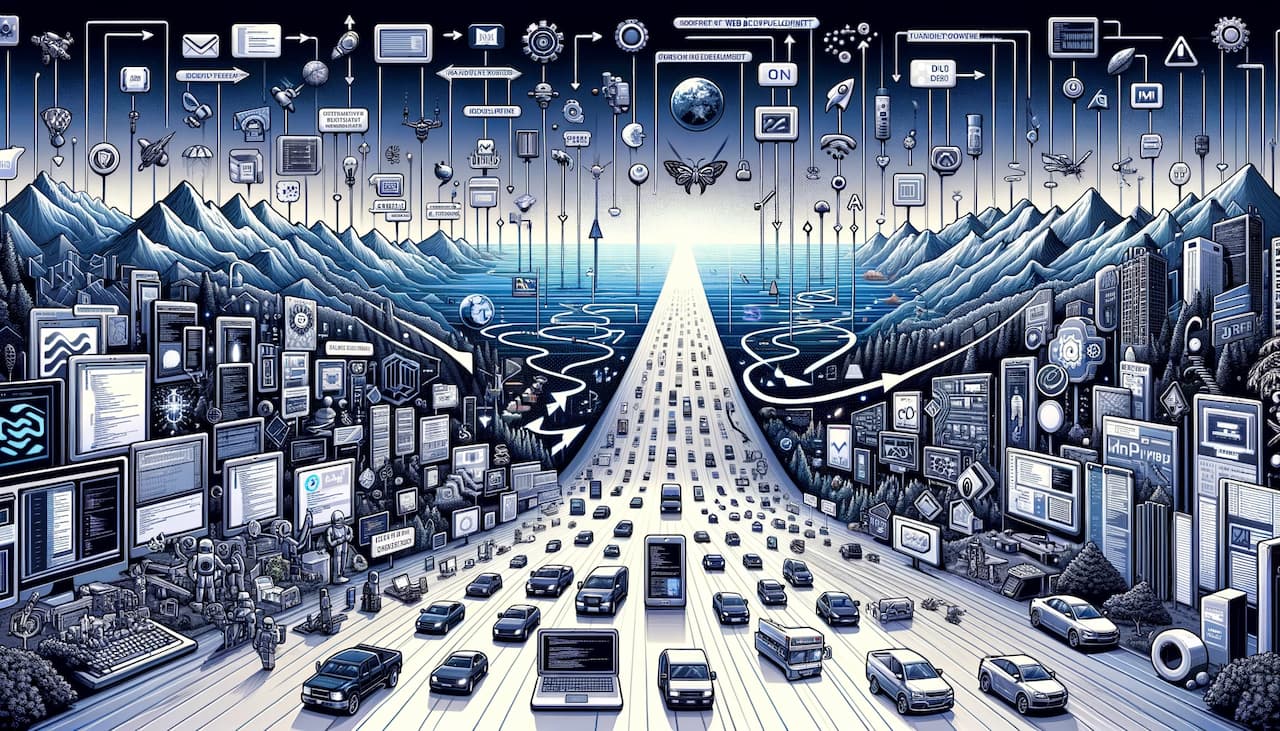Web development is a dynamic and foundational element of the digital era, constantly evolving to align with technological advancements and user expectations. This article explores the current landscape of web development, spotlighting essential trends, the impact of new programming languages, and envisaging the future of online experiences.
The concept of responsive design has revolutionized web development, responding to the surge of mobile devices by ensuring websites adapt flawlessly to different screens. This paradigm shift influences not only technical strategies but also design philosophies, emphasizing a mobile-first approach. Consequently, developers and designers are now committed to crafting responsive, flexible websites that ensure a seamless user experience on any device.
Current Trends in Web Development
The field of web development is marked by swift transformations, evolving from simple static pages to complex, interactive web applications. It now covers a vast array of technologies and methodologies dedicated to building sophisticated, user-centric online platforms.
As the digital environment grows, web development adapts, embracing new technologies, methods, and user expectations. This continuous progression is fueled by the desire to create more captivating, accessible, and secure online experiences. The growing incorporation of artificial intelligence (AI) and machine learning (ML) is notable, providing advanced solutions for personalized user interactions and data-informed decision-making. These technologies are streamlining routine tasks, enhancing interfaces, and offering predictive insights to elevate web functionality and user engagement.
Artificial Intelligence and Machine Learning in Web Development
The integration of AI and ML in web development not only enhances the functionality of websites but also revolutionizes the way users interact with online platforms. By harnessing the power of these technologies, developers can create systems that learn from user interactions, continuously improving the quality of user experience. This ability to process and analyze vast amounts of data in real-time allows for the creation of predictive models that can anticipate user needs and offer solutions before the user even recognizes the requirement.
Moreover, the use of AI and ML in web development extends to improving the security of online platforms. These technologies can identify patterns indicative of fraudulent activities and implement real-time safeguards, thus enhancing the trustworthiness of web applications. They can also automate the monitoring of user behavior to detect and respond to unusual activities, providing a proactive approach to security.
Advancements in Voice Search and Augmented/Virtual Reality
Voice search optimization and augmented/virtual reality (AR/VR) are swiftly becoming integral to web development. With the rising prominence of digital assistants like Siri, Alexa, and Google Assistant, voice search optimization is essential for enhancing online visibility and user experience. Concurrently, AR and VR are revolutionizing user interaction with digital content, providing immersive experiences previously unimaginable. These technologies are pioneering new avenues for engaging web experiences, from virtual product trials in e-commerce to immersive real estate tours. As they evolve, they will significantly influence the future of web development.
Emerging Trends in Web Development:
- Single Page Applications (SPAs)
- Serverless Architectures
- Progressive Web Apps (PWAs)
- API-First Development
The Role of Programming Languages
| Language | Use Case |
| JavaScript | Front-end and back-end development through frameworks like React and Node.js. |
| Python | Back-end development, data analysis, and machine learning with Django and Flask. |
| Ruby | Rapid web application development with Ruby on Rails. |
For those looking to dive deeper into the latest in software development, this guide offers insights into mastering new programming languages.
FAQs on Web Development and Programming
Why keep abreast of new programming languages?
Remaining current with emerging programming languages and technologies is crucial for developers to construct efficient, secure, and intuitive applications, staying aligned with industry norms and user expectations.
Starting points for web development beginners?
Newcomers should begin with the fundamentals of HTML, CSS, and JavaScript, progressively advancing to intricate languages and frameworks. A mix of online materials, tutorials, and coding bootcamps offers excellent learning opportunities.
The future of web development?
It is trending towards more personalized, interactive web experiences powered by AI, machine learning, and cutting-edge technologies.
Is self-learning web development feasible?
Absolutely, many successful web developers have honed their skills through self-directed study and practice, supported by an abundance of online resources, tutorials, and community forums.
Exploring practical coding through game development can also enhance understanding. Learn more about coding in Java by writing a game.
